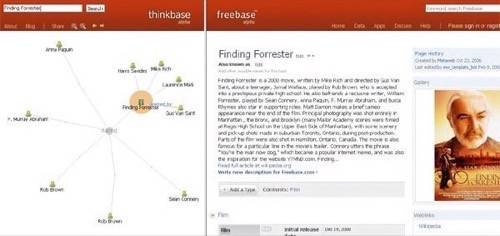If Freebase is an “open shared database of the world’s knowledge,” then Thinkbase (found via information aesthetics) is a mind map of the world’s knowledge. The interesting and incredibly addictive Freebase visualization and search tool is the brainchild of master’s degree student Christian Hirsch at the University of Auckland. Thinkbase is one of the cool proof of concept applications built on top of Freebase that we mentioned last week.

As we’ve mentioned here on RWW, Freebase is best suited for complex inferencing queries — the type that expose relationships between various entities to figure out an answer. Things like, “What’s the name of the actor who was in both “The Lord of the Rings” and “From Hell?” (Answer: Ian Holm)
Thinkbase doesn’t necessarily answer those questions — at least not directly, but it does allow people to visually explore the relationships that Freebase can expose. Thinkbase employs the Thinkmap visualization software to visually represent the semantic relationships between objects on Freebase as an interactive mind map. Each object on the map is represented by an icon that corresponds to the type of object it is. For example, person, place, movie, song, or artwork.

The site uses a two-pane display, putting the relationship map in the left pane, and the Freebase entry for the active node in the right pane. Every node on a Thinkbase map and be expanded to see concepts related to that object, or collapsed to clean the graph of relationships you’re unconcerned with. Every map you create can also be linked to via a dynamic share URL.
Thinkbase is a really fun visual front end to the Freebase database that exposes the semantic relationships that such a database can reveal in a compelling way. Alex Iskold wrote last week that the problem with semantic search is that we’re asking the wrong questions. Tools like Thinkbase can help us start to think about what type of questions we should be asking by clearly showing the type of semantic relationships that databases like Freebase excel at finding.










